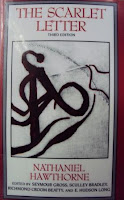Your library staff members recommend their favorite books.
Stephen's favorites
The Scarlet Letter, Nathaniel Hawthorne
While the concept of the “Great American Novel” is somewhat dubiously defined, it is certainly the title of a legacy of powerful texts which discuss and reveal the compulsions and concerns of American peoples. The permutations are myriad and singular: Cien Anos de Soledad and the Pre-Columbian, Last of the Mohicans and the Age of Expansion, Gatsby and The Sound and The Fury and On the Road, at the birth of Modernity, and the aggressively subversive literature of the Contemporary visible in the works of Vonnegut and Wolfe, Ellis and Palahniuk. Though by no means the first “American” novel, I would argue that Hawthorne’s exploration of passion and regret, of society and the alienated, of hierarchy and power, not only focuses on themes that are still with us in the present day, but presents us with the template of cynical pragmatism and mistrust of authority that drives the fundamentally rebellious nature of American Literature. And the writing is just plain beautiful.
Life is Elsewhere, Milan Kundera
 Written a decade and a half before the Velvet Divorce separated the nations of the Czech and Slovak peoples, Kundera’s story of the young poet Jaromil’s journey from childhood to adulthood is set against the backdrop of Prague’s shifting identity before, during, and after the second World War. Heart-achingly rendered with an eye for the modern human experience that is nonpareil, Life is Elsewhere follows the young poet Jaromil through a world that shifts effortlessly from the dreamlike to the mundane, from the lyric to the prosaic.
Written a decade and a half before the Velvet Divorce separated the nations of the Czech and Slovak peoples, Kundera’s story of the young poet Jaromil’s journey from childhood to adulthood is set against the backdrop of Prague’s shifting identity before, during, and after the second World War. Heart-achingly rendered with an eye for the modern human experience that is nonpareil, Life is Elsewhere follows the young poet Jaromil through a world that shifts effortlessly from the dreamlike to the mundane, from the lyric to the prosaic. Whereas works like Joyce’s Portrait of the Artist and Twain’s The Adventures of Tom Sawyer explore the coming of age motif through a hazy lens of provincialism, Kundera’s protagonist is born in a bustling city that itself was born through strife. The young man’s progress is full of promise and disappointment as he searches for his place in an evolving world.
Company, Samuel Beckett
 Originally published in 1979, it was posthumously collected with two other of Beckett’s most powerful, late “closed space” pieces (Ill Seen, Ill Said and Worstward Ho) into the single volume Nohow On. The narrative explores the slipping consciousness of one “on his back in the dark” as he attempts to alleviate his loneliness by devising another consciousness other than his own “all for company.” The piece’s stark beauty as it explores memories from the deviser’s past contrasts sharply with the terse interpellative analysis of the imagined counterpart to create a purely internal tension that removes certitude of knowledge from experience.
Originally published in 1979, it was posthumously collected with two other of Beckett’s most powerful, late “closed space” pieces (Ill Seen, Ill Said and Worstward Ho) into the single volume Nohow On. The narrative explores the slipping consciousness of one “on his back in the dark” as he attempts to alleviate his loneliness by devising another consciousness other than his own “all for company.” The piece’s stark beauty as it explores memories from the deviser’s past contrasts sharply with the terse interpellative analysis of the imagined counterpart to create a purely internal tension that removes certitude of knowledge from experience. Coming tomorrow: Laura's favorites! Check in again then.
